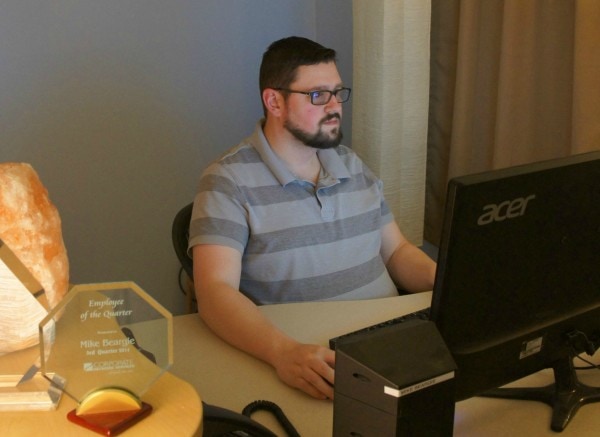Like most people, I spend most, if not all, of my worktime on a computer. That’s the key ingredient to knowing whether telecommuting is even an option.
One of the advantages of working for MainSpring is having the freedom of working from home. Switching from an office job of five years to a home office was a huge lifestyle change for me, so it’s not something I’ve taken lightly. My goal is to share a bit of what’s helped me find success in telecommuting.
Defining your space
In an office, the environment is chosen for you and you make small adjustments to personalize it. With telecommuting, you get to completely define all aspects of your space. So what are some of the things that people don’t think about when defining their space? With eight hour- days in one room, it’s important to fully consider and adapt that space to your needs.
 The first focus of my space was the empty room itself. My office choice was an empty bedroom. Most important for me was comfort and preventing distractions. I started with carpeting, then painted the walls cool blue (known to be relaxing and help focus). Natural light was important, but privacy was a concern because of the first floor location. Wood blinds let a lot of light in, while still keeping my privacy. Sheer curtains completed the job.
The first focus of my space was the empty room itself. My office choice was an empty bedroom. Most important for me was comfort and preventing distractions. I started with carpeting, then painted the walls cool blue (known to be relaxing and help focus). Natural light was important, but privacy was a concern because of the first floor location. Wood blinds let a lot of light in, while still keeping my privacy. Sheer curtains completed the job.
Next up: things to fill in the office. Two purchases were a desk and chair. I would say the chair is the most important factor to my home office. I found a used office furniture store and purchased a Herman Miller Aeron chair, my most expensive purchase.
For the desk, I found a unique heavy duty adjustable height desk used. I filled in the rest of the office with the usual, including a DAS keyboard.
Setting goals
It takes discipline to successfully work from home. What does success mean to you? Is success measured by time billed? Or maybe the amount of tickets you close? Don’t forget to include social and personal success when setting your goals.
For me, success is making sure that at least 80 percent of my workday is spent working on projects. It’s important to discuss expectations with your employer to help you measure your company success.
Setting personal goals, like camping trips, and activities like weekly piano lessons and monthly movie nights with friends are very important to me. Measuring my social successes became a running joke, as in—did I leave the house today? Socialization fills the gap of not working in an office.
Starting routines
Routines are also important, they help you set a normal standard to stay productive.
I divided my routines in two: personal and company. Luckily, our firm’s routines were already set for me as a weekly video conference, daily call, interval-based reviews and in-person events. For my personal routine, I outlined a schedule of what I had previously done. I took that and kept the important parts of a normal day and included that in my routine.
Setting routines will also help you overcome distractions and pitfalls such as working in pajamas or tackling household chores during your lunch break. Once I walk into the office, I’m at work, not at home.
One year in
By now, hopefully you’ve defined success and created your routines. Don’t forget to adjust regularly to meet your needs and goals. Since starting telecommuting, I’ve adjusted my routine and environment constantly.
Today’s technology with video and audio conferencing can bring you together with your coworkers and clients in ways previously impossible. With proper planning and adjustments, success with telecommuting is fairly simple. Check out my colleague’s blog about embracing telecommuting for even more pointers.
